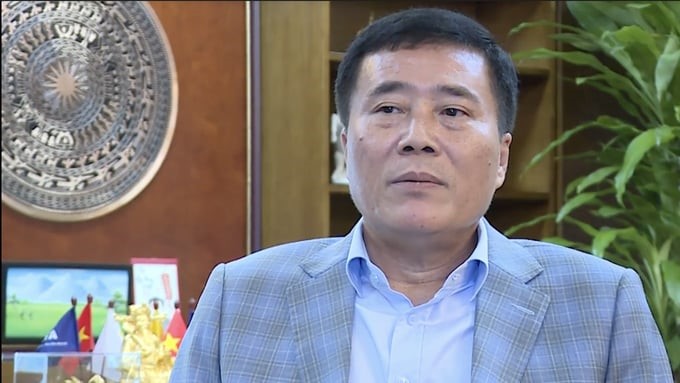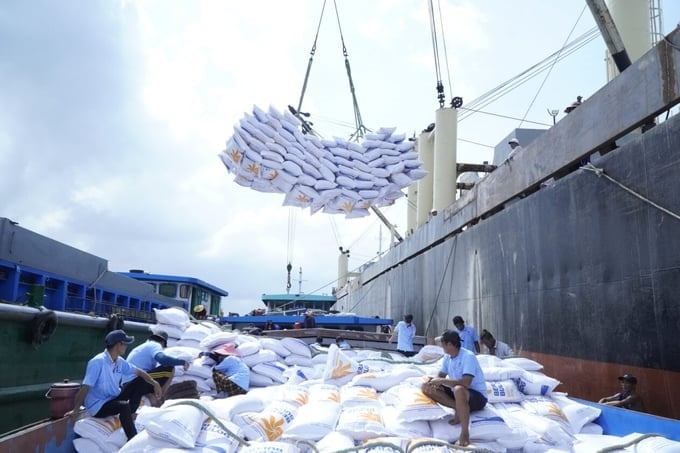May 29, 2025 | 15:54 GMT +7
May 29, 2025 | 15:54 GMT +7
Hotline: 0913.378.918
May 29, 2025 | 15:54 GMT +7
Hotline: 0913.378.918
In a recent meeting of the Ministry of Industry and Trade on removing difficulties for agricultural product exports, the Vietnam Food Association (VFA) proposed applying a floor price to rice exports.
This proposal is made in the context that rice exports are quite favorable, with a turnover of USD 2.65 billion in the first 5 months of 2024, up 38% over the same period last year.
VFA expects that imposing a floor price will prevent the phenomenon of businesses competing unfairly on price, thereby ensuring the value of Vietnamese rice grains. However, there are many conflicting views surrounding this story, with some businesses bitterly opposing it.

Mr. Truong Sy Ba, Chairman of the Board of Directors and General Director of Tan Long Group, said that imposing a floor price on rice exports as proposed by VFA is completely non-market because the floor price will have no value when the international market price is higher than the floor price.
Mr. Truong Sy Ba, Chairman of the Board of Directors and General Director of Tan Long Group, expressed: "I completely disagree with VFA's viewpoint when the unit proposed that the Prime Minister impose a floor price on rice exports just because of two winning contracts to export rice to Indonesia at an average price about USD 15/ton lower than the market price for a total value of USD 580/ton. With this lower price, it cannot be said that businesses are dumping."
The characteristic of the agricultural product market not only in Vietnam but also in the world is the future market. The supply source is greatly affected by weather, seasons, and diseases, so future factors will determine price trends. Any business that predicts a downward trend in future prices will sign a contract with a reduced price, and they will still make a profit.
Specifically, in the case of a business winning a bid in Indonesia, the business signs an export contract with a delivery time in July. Maybe they judge that the rice price at this time will drop by even lower than 15 USD/ton; the business still earns profit. The story of a business proactively identifying price trends to sign a sale is the business's freedom and cannot be said to be dumping.
On the contrary, if the market price increases, businesses still have to deliver goods and must accept losses. According to Mr. Ba, "This is an enterprise's business; it cannot be said to have a major impact on food security, national security, or people."
Mr. Ba said that imposing a floor price on rice exports as proposed by VFA is completely non-market because the floor price will have no value when the international market price is higher than the floor price.
In case the international market price is lower than the market demand floor price, rice will be purchased from other countries in the world, such as Thailand, Myanmar, India, Pakistan, etc.
"Invisibly, Vietnamese rice will not be able to be exported. The floor price at that time will be a barrier, like an export ban. As a result, Vietnamese farmers will not be able to sell their products, and domestic prices will drop very deeply," Mr. Ba analyzed.
Mr. Ba said that the Chairman of VFA made such a proposal but had not discussed it with any businesses in the rice industry or with association members.
Mr. Ba shared that no country exporting grain in the world, especially wheat - a commodity traded in hundreds of millions of tons each year, has barriers on export floor prices, and they operate completely under the free market. Any surrounding rice-exporting countries, such as Myanmar, India, Thailand, Pakistan, etc., also do not impose export floor prices, nor are any countries seen to have a centralized market, except for support contracts from the Government.

Any surrounding rice-exporting countries, such as Myanmar, India, Thailand, Pakistan, etc., also do not impose export floor prices. Photo: LT.
Mr. Ba took the lesson from the Philippines as an example. Previously, the Philippines applied the centralized market; the Government imported rice and distributed it domestically. However, many problems occurred later, especially the appearance of group interests. Accordingly, this country has abandoned the centralized market and now operates under the private market, allowing the private economy to freely buy and sell.
"I think Vietnam must look at the lessons from its surrounding countries as well as the world about the market economy," the Chairman of the Board of Directors and General Director of Tan Long Group emphasized.
Regarding VFA's claim that some businesses currently export rice at prices lower than the market price, seriously affecting the interests of farmers, Mr. Ba emphasized that "this is not correct" because the output that businesses won the bid from Indonesia is sold at a price 15 USD/ton lower than the market price because they judged that future prices will decrease. And that's right; the price these days is dropping very sharply.
"The story of them signing 90,000 tons, compared to Vietnam's total annual rice export output of up to 7-8 million tons, has no impact at all," Mr. Ba said.
However, Mr. Ba affirmed: "If the floor price is imposed, the domestic price will immediately drop deeply because goods cannot be sold. Thus, rice farmers will suffer the most."
Previously, Vietnam also used to impose the floor price on rice exports, but then many shortcomings were revealed. For many months, businesses could not export, farmers could not sell their goods, and domestic rice prices continuously decreased deeply. After that, the Government had to abolish the floor price.
He analyzed that if the floor price is imposed, two cases will occur. One is that the international market price is higher than the floor price offered by Vietnam. This does not affect anything; Vietnam will still export normally. On the contrary, if a floor price is set, who and what unit will do this? Is it VFA? What basis will VFA base its valuation on?
"The price is set by the buyer and seller, not determined by VFA. If VFA sets a price higher than the international market price, Vietnam cannot export. This is no different than banning exports," Mr. Ba stated his opinion.
Besides, Mr. Ba also assumed that if VFA is the unit that sets the floor price and submits it to the Prime Minister, it means that Vietnam's export orders will all have to go through VFA for registration, meaning additional administrative procedures and costs for businesses.
"We have been a rice trader for many years. We are also the largest importer of corn, wheat, soybean meal, etc. in Vietnam, so we completely understand how the market operates. Therefore, I bitterly oppose the application of the rice export floor price," the Chairman of the Board of Directors of Tan Long Group expressed his decisive attitude.
Mr. Truong Sy Ba, Chairman of the Board of Directors and General Director of Tan Long Group, affirmed: "The price is set by the buyer and seller, not determined by VFA. If VFA sets a price higher than the international market price, Vietnam cannot export. This is no different than banning exports."
Translated by Thu Huyen

(VAN) The mutual export of agrifood products between the European Union (EU) and the United Kingdom (UK) must occur again without certification, border controls or other red tape. This was agreed at the UK-EU summit.
/2025/05/22/5121-2-173645_677.jpg)
(VAN) NBSAP Tracker identifies strengths and areas for improvement in the National Biodiversity Strategy, based on each region’s priorities and capacities.

(VAN) The draft amendment to the Circular on rice export trading stipulates a periodic reporting regime for rice exporting enterprises.

(VAN) Dong Thap farmers attained an average profit margin of 64% during the summer-autumn 2024 crop (first season), while An Giang and Kien Giang farmers followed with 56% and 54%, respectively.

(VAN) As a doctoral student doing research on renewable energy and electrification at Harvard University, the author shares his musings on electricity, nature, and countryside memories.

(VAN) The decree on Extended Producer Responsibility (EPR) ensures transparent management and disbursement of support funds, avoiding the creation of a “give-and-take” mechanism.

(VAN) Hue City rigorously enforces regulations regarding marine fishing and resource exploitation, with a particular emphasis on the monitoring of fishing vessels to prevent illegal, unreported, and unregulated (IUU) fishing.